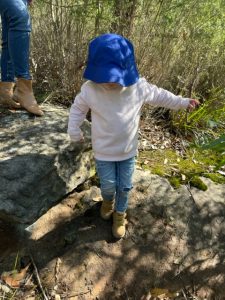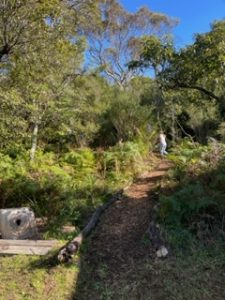A bush preschool, also known as a nature-based or forest preschool, offers several benefits for children’s development and learning. Here are some of the advantages:

- Connection with nature: Bush preschools provide ample opportunities for children to explore and engage with the natural environment. Spending time in nature has been linked to numerous benefits, including improved mental health, increased creativity, enhanced problem-solving skills, and better physical well-being.
- Physical development: Playing and learning in an outdoor setting allows children to engage in physical activities such as running, climbing, and balancing. These activities promote gross motor skills development, coordination, and overall physical fitness.
- Cognitive development: The natural world presents endless opportunities for children to observe, investigate, and make sense of their surroundings. Bush preschools often incorporate hands-on activities, such as nature walks, plant identification, and animal observations, which stimulate curiosity, critical thinking, and scientific inquiry.
- Creativity and imagination: Nature provides a rich sensory experience that sparks children’s imagination and creativity. Being in an open, unstructured environment encourages imaginative play and the development of storytelling skills. Natural materials like sticks, leaves, and rocks can be used as props and tools for creative expression.
- Emotional and social development: Outdoor environments promote social interaction, cooperation, and collaboration among children. They learn to navigate and negotiate with their peers, fostering empathy, communication skills, and conflict resolution abilities. Being in nature also has a calming effect on many children, reducing stress levels and promoting emotional well-being.
- Environmental awareness and stewardship: By spending time in nature, children develop a deep appreciation for the environment and an understanding of their role as caretakers. Bush preschools often incorporate lessons on environmental conservation, sustainability, and respect for the natural world, fostering a sense of responsibility and empathy towards the environment.
- Health and well-being: Spending time outdoors exposes children to sunlight, fresh air, and natural elements, which contribute to overall physical health. Additionally, being in nature has been shown to reduce stress, improve mood, and enhance mental well-being.
- Resilience and risk management: Outdoor settings provide children with opportunities to engage in risky play, such as climbing trees or balancing on uneven surfaces. By exploring their boundaries and taking manageable risks, children develop resilience, problem-solving skills, and the ability to assess and manage risk appropriately.

Overall, a bush preschool offers a holistic approach to early childhood education, providing children with a unique and valuable experience that fosters their physical, cognitive, social, and emotional development while cultivating a lifelong connection to nature.

























No Comments